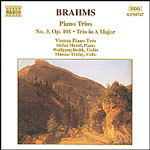
Brahms: Piano Trio No. 3 / Trio in A Major
 $25.00
Out of Stock
$25.00
Out of Stock6+ weeks add to cart
JOHANNES BRAHMS
Brahms: Piano Trio No. 3 / Trio in A Major
Vienna Piano Trio
[ Naxos / CD ]
Release Date: Thursday 1 July 2004
This item is currently out of stock. It may take 6 or more weeks to obtain from when you place your order as this is a specialist product.
"The Vienna Trio...adds another substantial entry to the.. chamber-music Catalog... Recommended"
- Fanfare
"they are fresh and worth their modest cost"
- Penguin Guide
"The Vienna Trio...adds another substantial entry to the.. chamber-music Catalog... Recommended"
- Fanfare
Johannes Brahms was born on 7th May 1833 in the Gangeviertel district of Hamburg, the son of a double-bass player and his wife, a seamstress seventeen years her husband's senior. It was intended that the boy should follow his father's trade and to this end he was taught the violin and cello, but his interest in the piano prevailed, enabling him to supplement the family income by playing in dockside taverns, while taking valuable lessons from Eduard Marxsen.
In 1853 Brahms embarked on a concert tour with the Hungarian violinist Eduard
Remenyi, during the course of which he visited Liszt in Weimar, to no effect, and struck up a friendship with the violinist Joseph Joachim, through whose agency he met the Schumanns, established now in Dusseldorf. The connection was an important one. Schumann was impressed enough by the compositions of his own
Brahms played to him to hail him as the long-awaited successor to Beethoven.
Schumann's subsequent break-down in February 1854 and ensuing insanity brought Brahms back to Dusseldorf to help Clara Schumann and her young family. The relationship with Clara Schumann, one of the most distinguished pianists of the time, lasted until her death in 1896.
It was not until 1862, after a happy period that had brought him a temporary position at the court of Detmold as a conductor and piano teacher, that Brahms visited Vienna, giving concerts there and meeting the important critic Eduard
Hanslick, who was to prove a doughty champion, pitting Brahms against Wagner and
Liszt as a composer of abstract music, as opposed to the music-drama of Wagner and the symphonic poems of Liszt, with their extra-musical associations. Brahms finally took up permanent residence in Vienna in 1869, greeted by many as the real successor to Beethoven, particularly after his first symphony, and winning a similar position in popular esteem and similar tolerance for his notorious lack of tact. He died in 1897.
Tracks:
Piano Trio No. 3 in C minor, Op. 101
Piano Trio in A major, Op. posth
